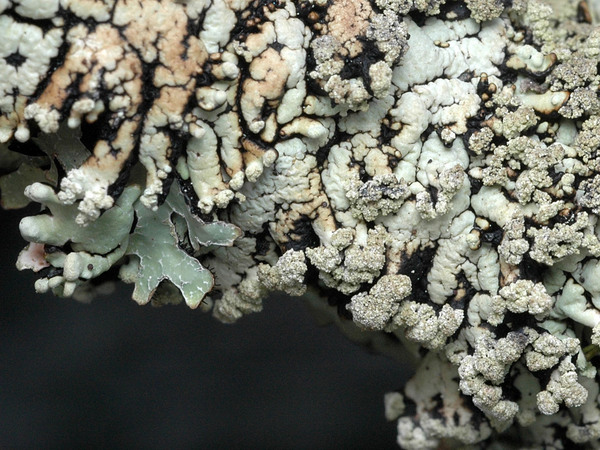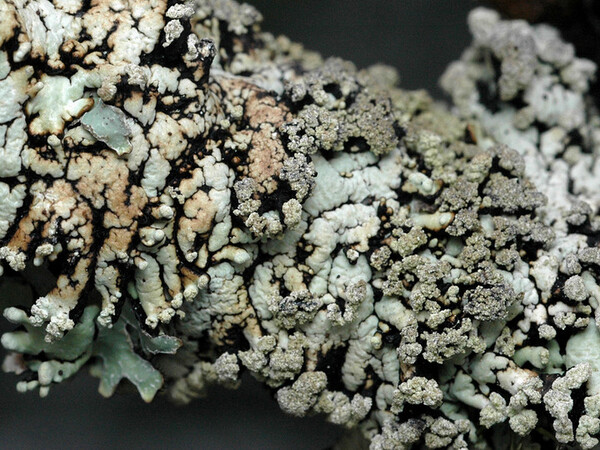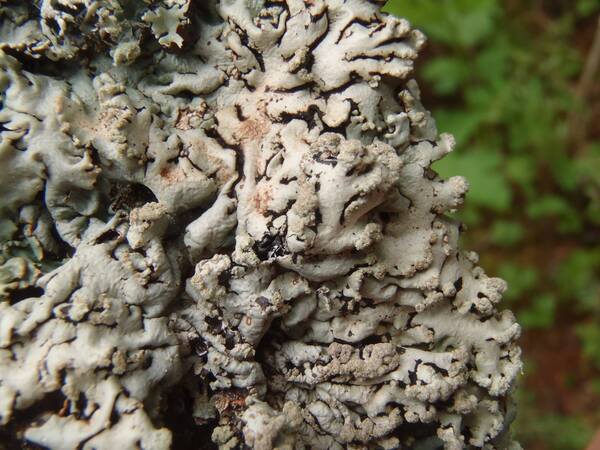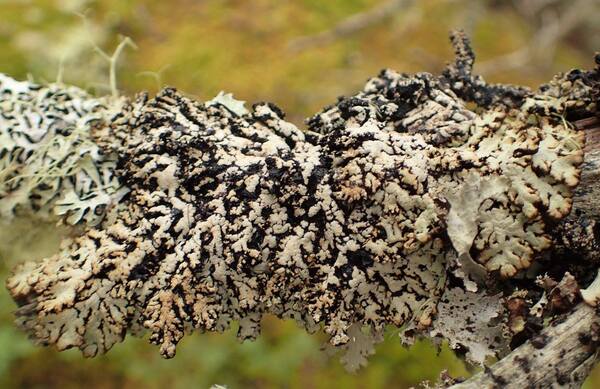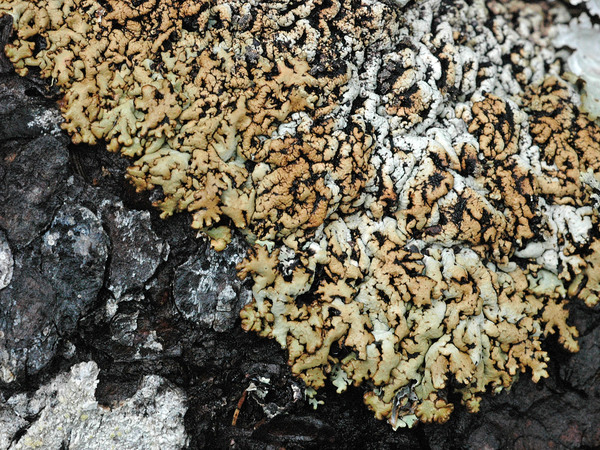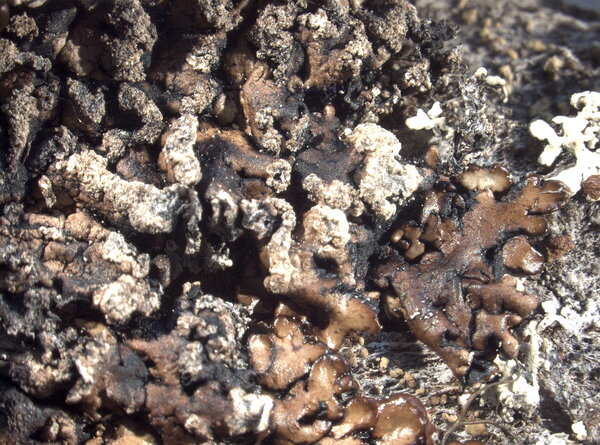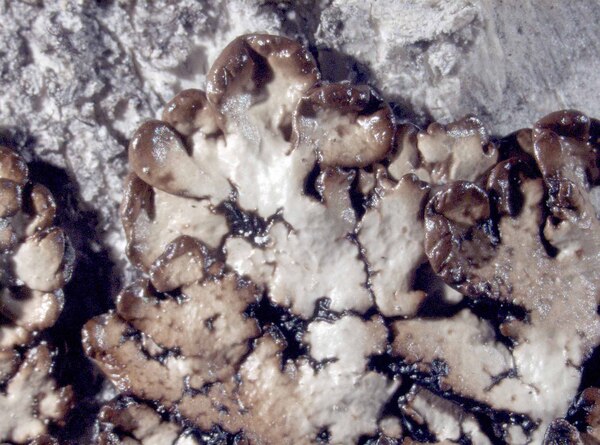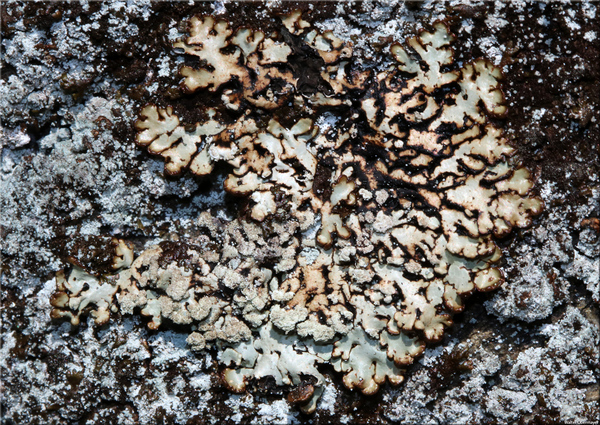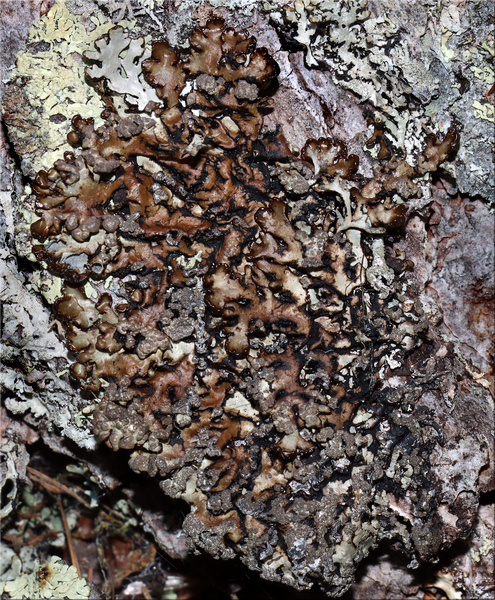Hypogymnia bitteri (Lynge) Ahti
Ann. Bot. Fenn., 1: 20, 1964. Basionym: Parmelia bitteri Lynge - Skr. Vidensk.-Selsk. Christiania, Math. Naturvidensk. Kl., 7: 138, 1921.
Synonyms: Hypogymnia obscurata auct.; Parmelia obscurata auct. et sensu Bitter
Distribution: N - Frl, Ven (Nascimbene & Caniglia 2000, 2000b, 2002c, 2003c, Nascimbene & al. 2006e), TAA (Nascimbene & Caniglia 2000b, 2002c, Nascimbene & al. 2005, 2006, 2006e, 2007b, 2009, 2010, 2014, 2014c, 2022, Nascimbene 2006b, 2008b, 2013, 2014, Nascimbene & Marini 2015, Nimis & al. 2015, Trindade & al. 2021), Lomb (Nascimbene & al. 2006e), Piem (Isocrono & al. 2004), VA (Matteucci & Vanacore Falco 2015), Emil (Fariselli & al. 2020). C - Tosc, Abr. S - Bas (Potenza 2006), Cal (TSB 12149), Si.
Description: Thallus foliose, heteromerous, dorsiventral, adpressed, forming more or less regular, up to 9(-12) cm wide rosettes, the lobes contiguous, (0.5-)1-3(-4) mm broad, clearly swollen especially in apical parts. Upper surface greenish grey to brown in sun-forms and/or in peripheral parts, dark-mottled, rather glossy, becoming rugose, with mainly terminal, blue-grey or whitish grey, capitate soralia both on the main lobes and on short, upturned, lateral lobes, sometimes also with secondarily diffuse laminal soredia. Lower surface black, erhizinate. Upper cortex of tightly packed, more or less anticlinally oriented hyphae, the cell walls with Cetraria-type lichenan; medulla soon becoming hollow, lining the cavity inside the lobes, the ceiling of the cavity white or dark, the floor dark; lower cortex dark, paraplectenchymatous. Apothecia and pycnidia extremely rare (not observed in Italian material). Spot tests: upper cortex K+ yellow, C-, KC-, P- or P+ pale yellow, UV-; medulla K-, C-, KC+ orange-red, P-, UV- or UV+ pale blue-violet. Chemistry: upper cortex with atranorin and chloroatranorin; medulla with physodic acid (major), 3-hydroxyphysodic acid, 2'-O-methylphysodic acid (minor and/or accessory), and an unknown accessory substance.Note: a cool-temperate to boreal-montane, circumpolar lichen found on acid bark, especially of conifers, occasionally on lignum and on siliceous rocks, with optimum near treeline. Most common in the Alps, but extending along the Apennines up to the mountains of Sicily.
Growth form: Foliose, narrow lobed
Substrata: bark
Photobiont: green algae other than Trentepohlia
Reproductive strategy: mainly asexual, by soredia, or soredia-like structures (e.g. blastidia)
Commonnes-rarity: (info)
Alpine belt: absent
Subalpine belt: rather rare
Oromediterranean belt: absent
Montane belt: rare
Submediterranean belt: absent
Padanian area: absent
Humid submediterranean belt: absent
Humid mediterranean belt: absent
Dry mediterranean belt: absent

Predictive model
Herbarium samples
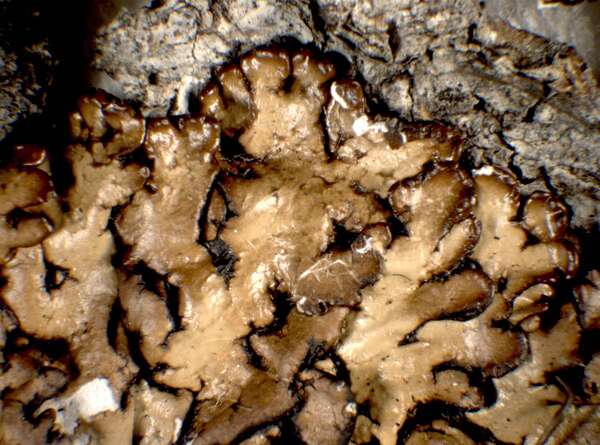

P.L. Nimis; Owner: Department of Life Sciences, University of Trieste
Herbarium: TSB (9457)
2001/12/12
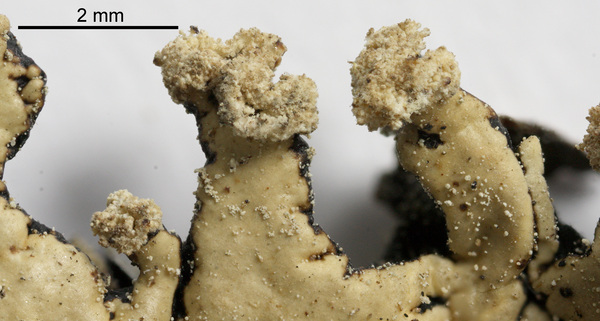

Felix Schumm - CC BY-SA 4.0
[1055], Österreich, Land Salzburg, Tennengebirge (bei Bischofshofen), Anton-Proksch-Haus bei Werfenweng, Ladenberghöhe, ca. 1630 m. Leg. Schumm 19.08.1969, det. Schumm 1969
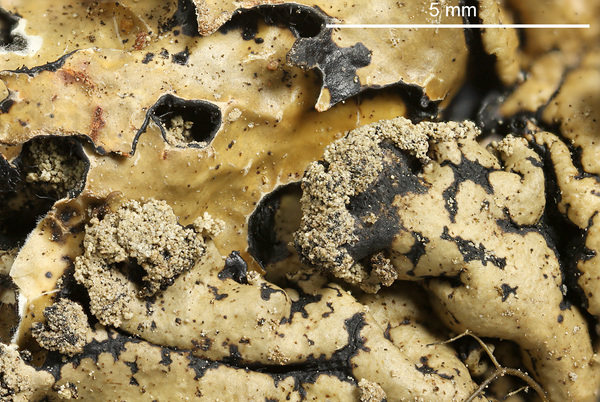

Felix Schumm - CC BY-SA 4.0
[1055], Österreich, Land Salzburg, Tennengebirge (bei Bischofshofen), Anton-Proksch-Haus bei Werfenweng, Ladenberghöhe, ca. 1630 m. Leg. Schumm 19.08.1969, det. Schumm 1969
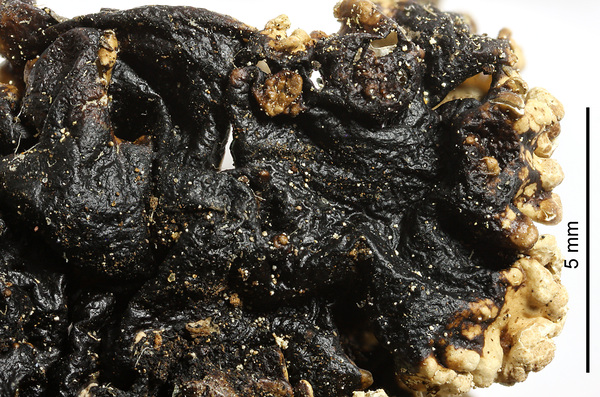

Felix Schumm - CC BY-SA 4.0
[1055], Österreich, Land Salzburg, Tennengebirge (bei Bischofshofen), Anton-Proksch-Haus bei Werfenweng, Ladenberghöhe, ca. 1630 m. Leg. Schumm 19.08.1969, det. Schumm 1969
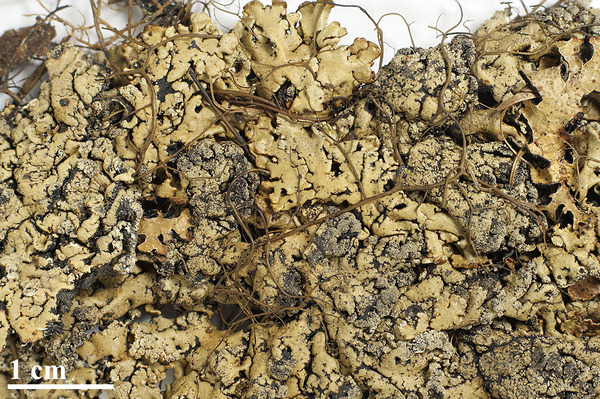

Felix Schumm - CC BY-SA 4.0
[1055], Österreich, Land Salzburg, Tennengebirge (bei Bischofshofen), Anton-Proksch-Haus bei Werfenweng, Ladenberghöhe, ca. 1630 m. Leg. Schumm 19.08.1969, det. Schumm 1969
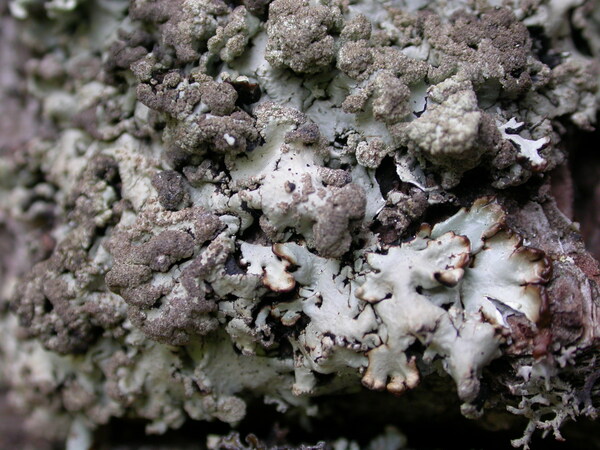

Juri Nascimbene - CC BY-SA 4.0
Stelvio National Park, Reg. Trentino-Alto Adige Prov. Trento, Italy.
07.2005
Growth form: Foliose, narrow lobed
Substrata: bark
Photobiont: green algae other than Trentepohlia
Reproductive strategy: mainly asexual, by soredia, or soredia-like structures (e.g. blastidia)
Commonnes-rarity: (info)
Alpine belt: absent
Subalpine belt: rather rare
Oromediterranean belt: absent
Montane belt: rare
Submediterranean belt: absent
Padanian area: absent
Humid submediterranean belt: absent
Humid mediterranean belt: absent
Dry mediterranean belt: absent

Predictive model
| Herbarium samples |


P.L. Nimis; Owner: Department of Life Sciences, University of Trieste
Herbarium: TSB (9457)
2001/12/12


Felix Schumm - CC BY-SA 4.0
[1055], Österreich, Land Salzburg, Tennengebirge (bei Bischofshofen), Anton-Proksch-Haus bei Werfenweng, Ladenberghöhe, ca. 1630 m. Leg. Schumm 19.08.1969, det. Schumm 1969


Felix Schumm - CC BY-SA 4.0
[1055], Österreich, Land Salzburg, Tennengebirge (bei Bischofshofen), Anton-Proksch-Haus bei Werfenweng, Ladenberghöhe, ca. 1630 m. Leg. Schumm 19.08.1969, det. Schumm 1969


Felix Schumm - CC BY-SA 4.0
[1055], Österreich, Land Salzburg, Tennengebirge (bei Bischofshofen), Anton-Proksch-Haus bei Werfenweng, Ladenberghöhe, ca. 1630 m. Leg. Schumm 19.08.1969, det. Schumm 1969


Felix Schumm - CC BY-SA 4.0
[1055], Österreich, Land Salzburg, Tennengebirge (bei Bischofshofen), Anton-Proksch-Haus bei Werfenweng, Ladenberghöhe, ca. 1630 m. Leg. Schumm 19.08.1969, det. Schumm 1969


 INDEX FUNGORUM
INDEX FUNGORUM
 GBIF
GBIF
 DOLICHENS
DOLICHENS
